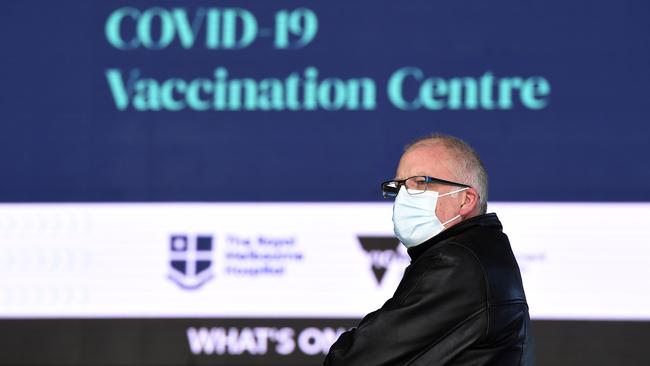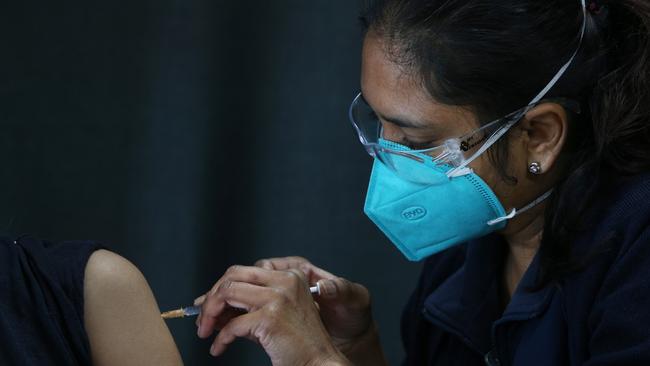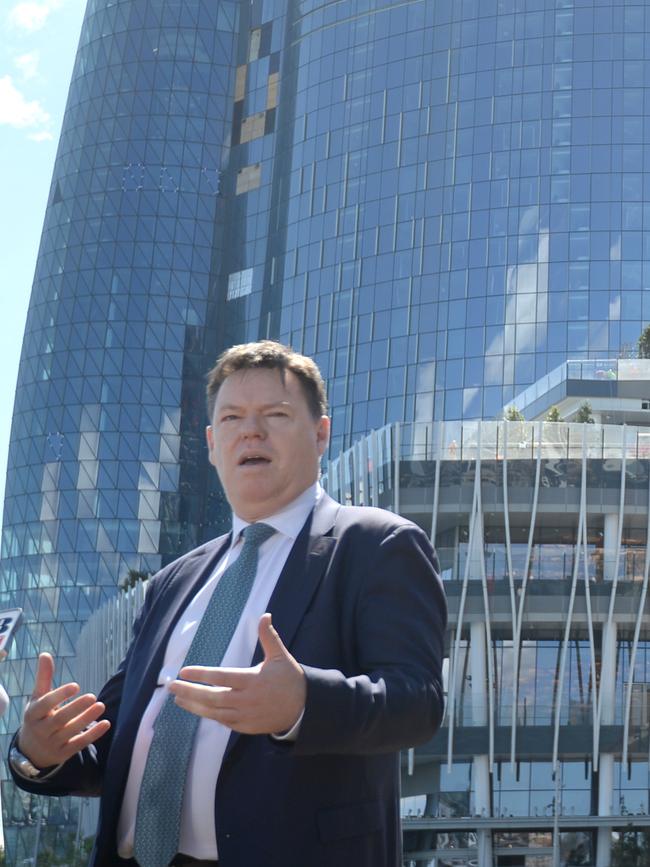Business becomes health adviser: 11pc of workers against mandatory vaccines
As businesses become more confident guiding staff towards vaccinations, they have found they are increasingly taking on a key role: health adviser.

As businesses become more confident guiding staff towards vaccinations, they have found they are increasingly taking on a key role: health adviser.
Olivier Chretien, chief executive of ASX-listed undertaker InvoCare, said a “small percentage of his staff have indicated they will not get vaccinated”.
This is despite the Delta variant and subsequent lockdowns in NSW and Victoria leading to the company to enforce limits on mourners at funerals in an effort to contain the spread.
“There is a lot of vaccination hesitancy,” Mr Chretien said. “I’m not criticising anything there but there has been a lot of mixed messaging in the last six months on vaccines in Australia and guidance on access.”
This has prompted InvoCare to direct its workforce to GP and other health experts for correct advice, rather than “learn it from social media”.
But Mr Chretien conceded the company may have to follow other companies – includingSPC and Healthscope – in mandating vaccinations if all else fails to lift the nation’s jab rate to 80 per cent. “It may come to that is the only way to reopen. But at this stage we strongly encourage,” he said.
His comments come as figures reveal almost one in 10 employees say they will quit their jobs if they are forced to be vaccinated against Covid-19. A study from research platform Glow reveals 11 per cent of Australian workers would prefer to leave than have employers force them to roll up their sleeves for the Covid-19 jab.
Mining giant BHP has become the first resources company to trial onsite vaccination, and is “actively assessing” Covid-19 jabs as a condition of workplace entry from next year, effectively joining Qantas, SPC and Healthscope in mandating immunisation.
BHP’s decision followed the Morrison government indemnifying businesses over in-house vaccine programs in a desperate attempt to lift the vaccination rate from about 30 per cent to 80 per cent – the threshold needed to quash lockdowns and reopen the nation.

Virgin Australia on Monday joined Qantas in mandating jabs for its workforce, with CEO Jayne Hrdlicka saying all pilots, cabin crew and airport staff must be fully vaccinated by November 15.
“It’s not an uncommon decision,” Ms Hrdlicka said. “Increasingly employers are starting to take tougher stances because it’s the only way to look people in the eye and tell them you’ve done the best job you can to keep them safe.”
Unlike other countries (particularly the UK, which did not give their citizens a choice over vaccine brand, paving the way for reopening), hesitancy has turned into resistance among Australians.
Rare blood clotting linked to the AstraZeneca vaccine has triggered conflicting messages from governments and health experts, with Queensland chief health officer Jeanette Young rejecting the jab for people under 40, putting her at odds with the federal government.
Meanwhile, the Australian Technical Advisory Group on Immunisation prefers Pfizer’s vaccine for immunising people 16-60 years, prompting many to hold out for that vaccine, leaving millions of doses of AstraZeneca’s – produced in Melbourne – going to waste.
New Crown Resorts chief executive Steve McCann said the Morrison government must provide clarity and certainty to businesses over Covid-19 vaccines, so Australia could reach the 80 per cent threshold and reopen.
“The challenge for industry is of course that we can’t really get where we want to get to in terms of the pandemic without working closely with government and vice-versa,” Mr McCann said.
“We are very supportive of what the government’s doing. That said, we would need to be reopened as soon as possible.
“It is very difficult for a company to come out and mandate vaccinations given the industrial relations and other issues and legal issues associated with that. So working with government to try to achieve some of those outcomes is what we’re intending to do.”

Similarly, Mr McCann said implementing vaccine passports – particularly at Crown’s sprawling complex in Melbourne’s Southbank that is Victoria’s biggest single-site employer – would also be challenging.
“I wouldn’t rule it out completely, but I think that it would be a much more manageable situation if it was aligned with government policy,” he said.
While Glow founder and chief executive Tim Clover said mandatory vaccinations was a contentious issue, dividing workplaces, he said the vast majority – 78 per cent – of the study’s 1200 respondents supported compulsory jabs.
Baby boomers were the most likely age group to support mandatory vaccinations in cafes, restaurants and pubs (71 per cent), sporting events (77 per cent) and indoor concerts and theatre (79 per cent).
But Mr Clover said Generation Z was the biggest battle of government and business, with the survey showing that 45 per cent believe you should not be vaccinated if going to a cafe, restaurant or pub; 36 per cent to a sporting event and 35 per cent to an indoor concert or theatre.
“It will be interesting to see what pressure this puts on those who – as our survey has shown – don’t want to be vaccinated,” Mr Clover said.
“While the Fair Work Ombudsman has outlined a four-tiered system in regards to mandatory vaccination in the workplace it remains for guidance only.
“And we’ve seen the backlash that SPC and Qantas received off the back of making vaccinations mandatory. Having said that, SPC made its announcement before Shepparton’s current outbreak, which may have changed a lot of people’s minds about mandatory vaccination.”








To join the conversation, please log in. Don't have an account? Register
Join the conversation, you are commenting as Logout